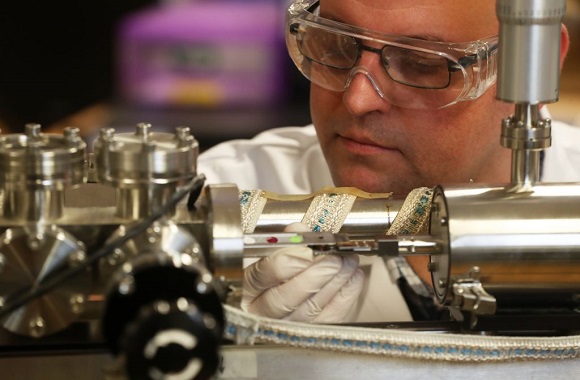
In late December 2021 the Cardiff Catalysis Institute (CCI) took delivery of Cardiff University’s first Aberration Corrected Scanning Transmission Electron Microscope (AC-STEM).
The CCI’s EM team have been working closely with Thermo Fisher ScientificTM to ready the CCI Electron Microscopy Facility (CCI-EMF) for the installation of Wales’ first Cold Field Emission Gun Spectra 200 S/TEM to enhance the catalyst characterisation capability of the CCI. The ability to image the smallest of objects, such as the atom, is limited by the effect of aberrations in a microscope’s lens system but with the new system imaging from 60-200 kV will be routine. This will allow the researchers of the CCI and new Transnational Research Hub (TRH) to build upon their already world-renowned reputation for novel catalyst development. The capabilities are further enhanced by the ultra-low-noise segmented Panther STEM detection system which will enable low-dose iDPC imaging of beam-sensitive materials used both industrially and in the research laboratory. Advanced analytics such as the Super-X Energy Dispersive X-Ray (EDX) spectrometer and Gatan’s Continuum detector for Energy Electron Loss Spectroscopy (EELS) will allow for the rapid and accurate acquisition of compositional information and trace element detection.
The Continuum EELS system will be the first of its type in Wales and represents the next generation of EELS and energy filtered electron microscopy.
With investment from ERDF through WEFO, HEFCW and The Wolfson Foundation, the new Cardiff Catalysis Institute Electron Microscopy Facility EM facility will not only house the new Spectra 200 but also re-house the existing CCI electron microscopes all under one roof in a purpose-built microscopy facility designed to be “ultra-quiet”, electromagnetically shielded and vibration free. The space will be shared with Cardiff’s outstanding surface science facility with the laboratories located right across the corridor from the new AC-STEM. The co-location of these state-of the art instruments, techniques and expertise provide a unique centre for materials imaging and spectroscopic analysis.
The CCI-EMF aims to become the core centre of expertise in microscopy in catalysis as well as providing a centralised suite of microscopy for characterising other nanomaterials and advanced materials (e.g., semiconductor devices, optoelectronic and photonic materials, and novel 2D materials). It will act as a hub for surrounding industry and R&D activities requiring electron microscopy analysis.